Taiwan profile - Timeline
- Published
A chronology of key events:
1683 - China's Qing Dynasty formally annexes Taiwan, which had hitherto been divided between aboriginal kingdoms and Chinese and European settlers, most prominently the Dutch.
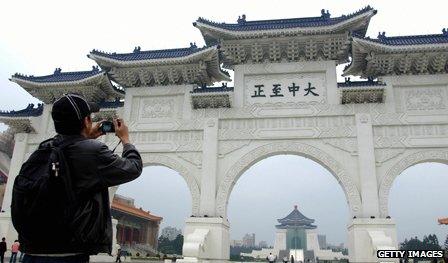
The National Chiang Kai-Shek Memorial Hall commemorates the man who led the Chinese Nationalist government in exile in Taiwan
1895 - China cedes Taiwan among other territories to Japan after losing the First Sino-Japanese War.
1915 - Tapani Incident prompts Japan to reform its administration of the settled population, which turns to civic and political activity. Japanese treatment of aboriginal population remains harsh.
1930 - Troops crush last major aboriginal uprising, the Wushe Rebellion.
1942 - Chinese Kuomintang government renounces all treaties with Japan and demands the return of Taiwan as part of any post-war settlement, which is endorsed by the Allies in the Cairo Declaration the following year.
1945 - The Allies place Taiwan under Chinese administrative control after Japan surrenders.
1947 - Discontent with centralised rule by Kuomintang mainlanders boils over in 228 Incident. Chinese authorities imposes martial law, kill large numbers of protesters demanding free elections and clean government, and ban thousands of others from political activity.
1949 - Communist victory in Chinese Civil War leads to evacuation of Kuomintang government to Taiwan, along with about two million refugees. Mainlanders dominate island until the end of martial law in 1987.
Taiwan-based Republic of China government retains UN and Western recognition as legitimate government of all China until the 1970s.
1950s-1960s - Rapid industrial development stimulated by export-oriented policy and US economic aid, while Kuomintang justifies one-party rule on the grounds of opposing any Communist threat.
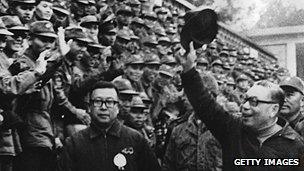
Chiang Ching-kuo suceeded his father Chiang Kai-shek as president
1971 - UN recognises Communist China as sole government of whole country after veteran Kuomintang leader Chiang Kai-shek refuses dual-representation deal. People's Republic takes over China's UN Security Council seat.
1975 - Chiang Kai-shek dies. His son Chiang Ching-kuo begins cautious policy of liberalisation, including the promotion of more native Taiwanese to positions of authority.
1977 - First opposition breakthrough at parliamentary elections by the Tangwai (Outside the Party) group.
1979 - Kaohsiung Incident, in which police kill pro-democracy protesters and arrest all available opposition leaders. International attention drawn to the Kuomintang's repressive rule.
1980 - Opposition leaders sentenced to long prison sentences over the Kaohsiung Incident.
1986 - Authorities do not prevent Democratic Progressive Party from organising, despite nominal ban on opposition parties. Candidates stand in elections under Tangwai banner.
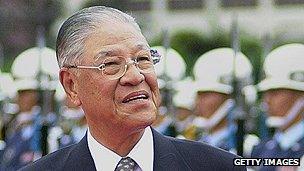
President Lee Teng-hui relaxed restrictions on native culture
1987 - Chiang Ching-kuo abolishes martial law, allows family visits to mainland.
1988 - Chiang dies. His chosen successor, Taiwan-born Lee Teng-hui, launches 'Taiwanisation' policy to dismantle many structures left over from 1949 and relaxes restrictions on native language and culture.
1996 - Free elections, in which Lee beats Democratic Progressive Party's Peng Min-ming. Communist China tries to disrupt elections with missile tests, urtailed by US dispatch of aircraft carriers to the region.
2000 March - Chen Shui-bian wins presidential elections, ending the Kuomintang party's 50-year monopoly of power.
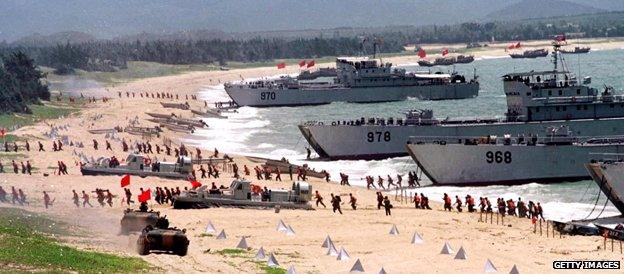
Mainland China's army has carried out several military exercises deemed to intimidate Taiwan
2000 May - Chen Shui-bian says in his inaugural speech that he will not declare independence as long as China does not attack. He says he won't call for a referendum on independence, nor abolish Taipei's official blueprint for an eventual reunion with mainland China.
China responds by accusing him of insincerity, and by saying he had evaded the key question of whether he considered Taiwan part of China.
2000 August - President Chen Shui-bian stops over briefly in the United States before starting a two-week tour of Central America and Africa. He gets no official welcome.
2000 October - Government halts work on the construction of a nuclear power plant, sparking a major political row. It argues that the facility - approved and started under the previous government - would not be a safe source of energy.
2000 October - Chang Chun-hsiung sworn in as prime minister. He replaces Tang Fei, from the main opposition Nationalist Party, who stepped down amid disputes with President Chen, over issues including the scrapping of the nuclear plant.
2001 April - The exiled Tibetan spiritual leader, the Dalai Lama, meets President Chen during a visit which draws strong opposition from China.
2001 April - US says it will go ahead with sales of submarines, warships and anti-submarine aircraft, but not the requested naval combat radar system Aegis. China protests and President George W Bush pledges to help Taiwan should China invade.
Sabre-rattling
2001 June - Taiwan test-fires Patriot anti-missile defence system bought from US, as China carries out military exercises simulating invasion of island.
2001 November - Taipei lifts a 50-year ban on direct trade and investment with China.
2001 December - Nationalist Kuomintang (KMT) party loses its parliamentary majority for the first time.
2002 January - Taiwan officially enters the World Trade Organisation, only a few weeks after China.
2003 May - Dramatic rise in cases of the pneumonia-like Sars virus.
2003 July - Taiwan is the final country to be removed from the WHO's list of countries which were badly affected by the Sars virus.
2003 November - Taiwan unveils the 508-metre Taipei 101 building, which it says is the world's tallest.
2003 November - Parliament approves bill to allow referendum on declaring independence should China attack. Referendums on sovereignty and changing country's name are not sanctioned.
Second term for Chen
2004 March - President Chen Shui-bian wins a second term by a slender margin. His win follows an apparent assassination attempt against him on the eve of elections.
2004 November - Court rejects opposition challenge that President Chen Shui-bian won March's presidential election unfairly.
2005 January - Aircraft chartered for the Lunar New Year holiday make the first direct flights between Taiwan and China since 1949.
2005 March - Taiwan condemns a new Chinese law giving Beijing the legal right to use force should Taipei declare formal independence.
2005 April - National Party (KMT) leader Lien Chan visits China for the first meeting between Nationalist and Communist Party leaders since 1949.
2005 June - Reform requiring future constitutional amendments to be put to a referendum arouses China's concern that it will be easier for activists to promote moves towards independence.
2005 July - National Party (KMT) elects mayor of Taipei Ma Ying Jeou as its new leader.
President under pressure
2005 December - Opposition KMT triumphs in municipal elections. The result is interpreted as a mid-term vote of no confidence in President Chen Shui-bian.
2006 February - Taiwan scraps the National Unification Council, a body set up to deal with reunification with the mainland. China says the decision could bring "disaster".
2006 June - Under pressure over corruption allegations against a family member, President Chen cedes some of his powers to the prime minister.
2006 October - President Chen survives an attempt by parliament to force a referendum on his rule - the second in four months. His opponents and supporters take to the streets.
2006 December - An earthquake off Taiwan cuts undersea cables, cutting off or limiting telecommunications across the region.
China highlights Taiwan as security threat in plans to upgrade military.
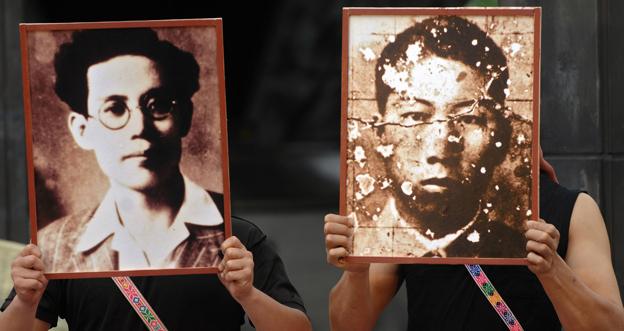
Aborigines display portraits of victims of a crackdown on protesters in the 228 Incident on 28 February 1947
2007 January - Taiwan defends school history textbooks which refer to China. Beijing accuses Taipei of introducing independence ideologies into the classroom.
2007 March - Newspaper reports that Taiwan has test-fired cruise missile capable of hitting Shanghai or Hong Kong.
2007 March - Taiwanese government begins removing statue of Chiang Kai-shek from Kaohsiung, sparking protests.
2007 April - China and Taiwan clash over route of Olympic torch relay ahead of 2008 Beijing games.
2007 August - The country attempts to join the UN for the first time under the name Taiwan, rather than the official title of Republic of China. The application is rejected.
2008 January - Opposition KMT wins landslide victory in parliamentary elections, beating President Chen Shui-bian's Democratic Progressive Party (DPP). Mr Chen steps down from post of DPP chairman.
Nationalists back in power
2008 March - Presidential elections. Ma Ying-jeou of the opposition Kuomintang Party is elected president.
2008 June - First formal talks with China since dialogue was suspended in 1999.
2008 July - President Ma apologises for the killing and imprisonment of tens of thousands of political dissidents in the 1950s and 60s - a period known as the white terror. The violence took place when martial law was imposed by the Kuomintang party after its leaders fled to the island in 1949 at the end of the Chinese civil war.
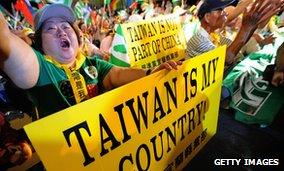
A 2008 visit by a senior Chinese official angered pro-independence supporters
2008 November - The highest ranking Chinese official to visit Taiwan in more than half a century holds talks in Taipei on improving relations. The visit of Chen Yunlin, China's top negotiator on Taiwan, was met with protests by pro-independence supporters.
Former President Chen Shui-bian arrested and charged with money laundering, bribery and embezzlement of government funds. Mr Chen said the allegations were politically motivated.
2008 December - Gift of two giant pandas by China seen as a further improvement in relations.
Cross-Straits detente
2009 March - Former President Chen Shui-bian goes on trial on charges including taking bribes, money laundering and extortion.
2009 April - China drops longstanding objections to Taiwan's participation in World Health Organisation. Taiwan says it will lift ban on investment from China.
2009 May - Chinese President Hu Jintao and the chairman of the governing Kuomintang (KMT) party, Wu Po-hsiung, agree to talks on a wide-ranging trade pact.
2009 July - The leaders of China and Taiwan exchange direct messages for the first time in more than 60 years, in a sign of warming ties.
President Ma Ying-jeou is elected head of the ruling party, the Kuomintang.
2009 August - Typhoon Morakot hits southern Taiwan, leaving hundreds dead in floods and mudslides. In September, premier Liu Chao-shiuan resigns amid criticism of the government's response.
2010 January - US approves the sale of air defence missiles to Taiwan under a proposed $6.7bn arms package. China suspends military contacts with the US, imposes sanctions on US firms involved.
Trade pact
2010 June - Taiwan and China sign landmark free trade pact seen as most significant agreement in 60 years of separation.
2011 February - A senior army officer is detained on suspicion of spying for China.
2011 March - Five convicted murderers are executed, the second use of the death penalty in the past year.
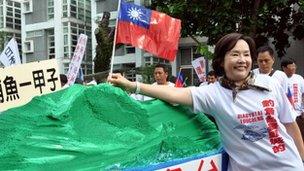
Taiwan also claims sovereignty over disputed islands in the East China Sea
2012 January - President Ma Ying-jeou wins a second term in office.
2012 July - Taiwan's economy contracts in three months to end of June, as the global slowdown weighed on export-dependent countries. Economy contracted 0.16% compared with the previous year.
2012 August - China and Taiwan sign investment protection deal that sets up formal channels to settle disputes. It details rights of Taiwanese investors if detained by Chinese authorities and vice versa. China is Taiwan's biggest trading partner, with bilateral trade worth $110bn (£70bn) a year.
2013 January - Japan turns back a small Taiwanese boat from East China Sea islands claimed by China and Taiwan. The row has left ties between Tokyo and Beijing severely strained. Four Taiwanese coastguard vessels escorted the boat. The islands are called Senkaku in Japan, Diaoyutai in Taiwan and Diaoyu in China.
2013 April - Taiwan holds its first live fire drills in five years, after President Ma Ying-jeou warns about China's rising military investment.
2013 May - Major diplomatic row erupts between Taiwan and Philippines after Filipino coastguards kill a Taiwanese fisherman in disputed waters.
2013 June - Taiwan and China sign cross-Strait services trade agreement, which allows the two sides to invest much more freely in one another's services market.
2013 October - Services trade agreement signed with China in June is stalled in Taiwan's parliament by opposition MPs, amid concerns that it will hurt industry and small businesses.
Formal contacts
2014 February - China and Taiwan hold their first government-to-government talks since the Communists came to power in 1949. The Taiwanese government minister in charge of the island's China policy meets his mainland counterpart in the eastern city of Nanjing.
2014 March - Opposition supporters occupy parliament to protest at cross-Strait services trade agreement, which they say would allow the mainland excessive influence over the Taiwanese economy by freeing up direct investment rules. Parliament has not yet ratified it.
2014 April - The head of the US Environmental Protection Agency visits Taiwan, the first visit by a cabinet-level US official for 14 years.
2014 June - The most senior Chinese official overseeing ties with Taiwan visits the island, amid controversy over a proposed trade pact.
2014 August - Dozens are killed and hundreds injured after a gas leak causes huge explosions in Taiwan's second largest city, Kaohsiung.
2014 October - Taiwan bans its senior government officials from higher studies in mainland China, citing national security reasons.
2014 December - President Ma Ying-jeou resigns as chairman of the ruling Kuomintang party after its crushing defeat in local elections. The polls were seen as a referendum on Mr Ma's pro-China policies.
2015 January - Former President Chen Shui-bian is released from prison on medical parole after after serving six years of a 20-year sentence for corruption.
2015 January - Mayor of New Taipei Eric Chu is elected chairman of the ruling Kuomintang (KMT) party.
2015 February - Prosecutors charge 118 people with offences related to the occupation of the island's parliament and government offices in 2014, dubbed the "Sunflower Movement", in protest over a proposed trade pact with China.
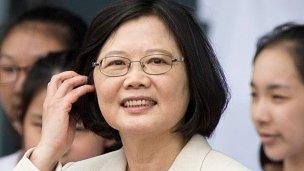
President Tsai Ing-wen led the pro-independence Democratic Progressive Party to victory in the 2016 elections
2015 March - China postpones the launch of four new flight routes near Taiwan after a fierce backlash from the island's authorities over the plan.
2015 October - The ruling Kuomintang (KMT) party drops Hung Hsiu-chu as its presidential candidate following a series of poor opinion poll ratings. She had been the party's first female candidate for the post.
2015 November - Taiwan's President Ma Ying-jeou and China's President Xi Jinping hold historic talks in Singapore, the first such meeting since the Chinese Civil War finished and the nations split in 1949.
Pro-independence win
2016 January - Pro-independence Democratic Progressive Party candidate Tsai Ing-wen wins presidential election, takes office in May.
2017 June - Panama switches diplomatic recognition from Taiwan to China, in a major coup for the latter. Sao Tome and Principe did the same in December 2016, leaving Taiwan to enjoy full diplomatic relations with only 20 other countries.
2017 December - Parliament votes to remove symbols of the island's authoritarian past - including references to the former leader, Chiang Kai-shek.